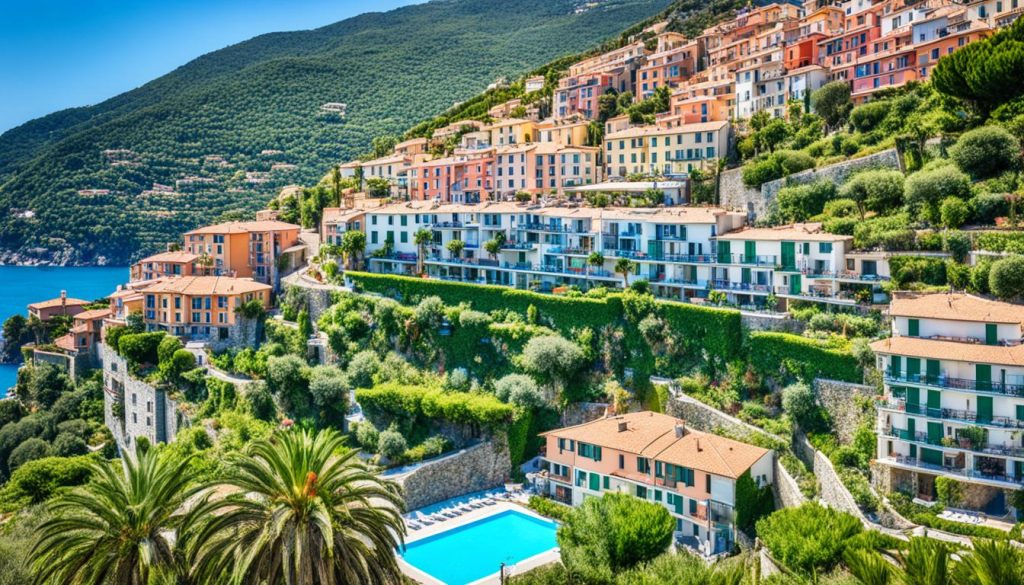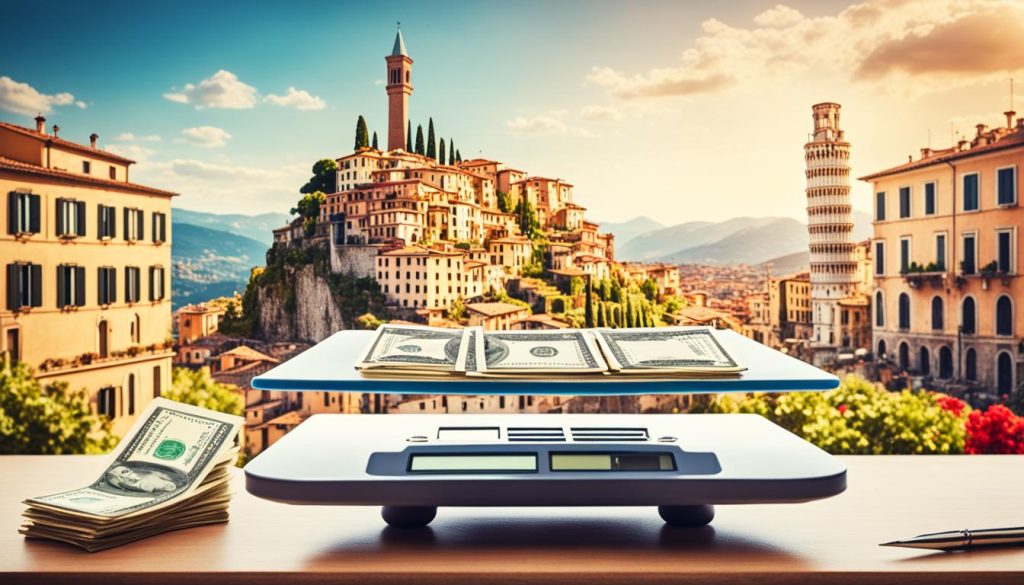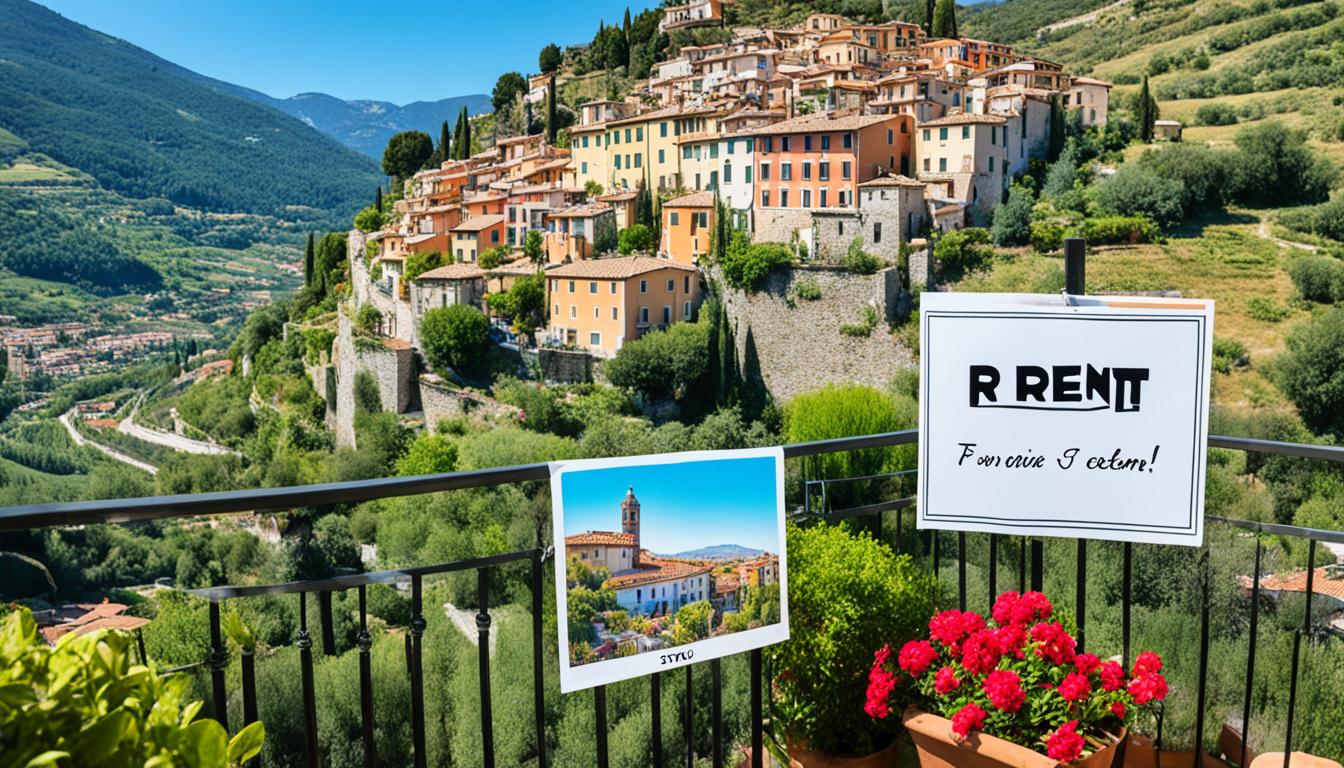Choosing between renting and buying in Italy is a big decision for expats. It’s not just about having a place to live. It involves your lifestyle, money, and what you plan for the future. Whether you’re looking at Renting in Italy or thinking about Buying Property in Italy, knowing your options is key. This guide will help you understand the Italian property market. It aims to ensure you make a choice that fits your life and goals.
Key Takeaways
- Understand the benefits and drawbacks of Renting in Italy versus Buying Property in Italy.
- Consider personal circumstances and lifestyle when evaluating your Expat Housing Choices.
- Financial implications play a crucial role in determining the best option for your situation.
- Research the Italian property market and stay informed about local conditions.
- Your future plans should influence your decision on renting or buying property.
Introduction to Renting and Buying in Italy
The Italian property market is diverse, perfect for those looking at renting and buying. It’s known for its rich culture, beautiful landscapes, and lively communities. Many expats are drawn to Italy, wanting to start new lives here. It’s key to understand both renting and buying to make good choices.
Renting is great for those who want flexibility and to explore before settling. Life as an expat in Italy means adapting to local ways and rules. Renting lets you do this without a big commitment. Buying property, however, means stability and a chance to invest, appealing to those wanting to put down roots.
There are challenges in the Italian property market, like price differences across regions and legal matters. Expats should know these when deciding between renting and buying. Knowing these things helps set the stage for a successful property journey in Italy.
Understanding the Italian Property Market
Looking into the Italian property market is key for expats thinking about renting or buying. Prices vary across regions, so a detailed market analysis is vital. Recent trends show growth in some areas, thanks to local and international interest.
Prices differ by region, with the north often having higher costs than the south. Cities like Milan and Florence see a rise in demand, mainly from young professionals and expats wanting city life. On the other hand, places like Abruzzo offer cheaper options, drawing families who prefer a quieter life.
Short-term rentals are on the rise, especially in popular tourist spots. More properties are being turned into rentals, making competition fierce among landlords. This affects how renting works. Knowing these trends helps expats make better choices for their needs and likes.
| Region | Average Property Price (per m²) | Price Trend (Year-on-Year % Change) | Rental Yield (%) |
|---|---|---|---|
| Lombardy (Milan) | €3,800 | 5% | 4.5% |
| Tuscany (Florence) | €3,200 | 4% | 4.2% |
| Villages (Abruzzo) | €1,200 | 2.5% | 5.0% |
| Sicily | €1,500 | 3% | 6.2% |
By keeping up with the Italian property market, expats can make better choices, whether renting or investing. This gives them more confidence and insight.
Why Expats Consider Renting in Italy

Many expats in Italy prefer renting over buying property. They do this for two main reasons. Renting gives them Benefits of Renting. It’s great for those who want to stay temporarily or explore different places in the country.
Flexibility and Mobility
Renting offers a lot of Flexibility in Housing. Expats can pick where they live or what type of property they want without the big commitment of buying. This lets them change their living situation for work or personal reasons easily.
It makes moving around simpler, fitting changes in their life or job better. Renting also lets them try out different areas. This helps them get to know the local culture and surroundings better.
Lower Upfront Costs
Renting is also cheaper upfront, which is good for newcomers adjusting to a new place. The Rental Cost Advantages include lower deposits and avoiding property taxes and maintenance costs. This can be a big help for expats who are still figuring out their long-term plans or are feeling financially unsure.
| Advantage | Renting | Buying |
|---|---|---|
| Flexibility in Location | High | Low |
| Upfront Costs | Lower | Higher |
| Maintenance Responsibilities | Landlord | Owner |
| Long-term Commitment | Short-term | Long-term |
Advantages of Buying Property in Italy
Buying property in Italy comes with many benefits for expats. It offers a chance for strong investment and provides stable housing for the long term. This can lead to both financial security and personal happiness.
Investment Potential
Italy’s property market has been steady through ups and downs in the economy. This makes it a good choice for investing in property. Property values have been rising, especially in popular spots. This means you could see your investment grow over time.
There’s also a steady demand for rentals in tourist areas. This means you could earn extra money from your property. Owning property can lead to good returns on your investment, helping to secure your financial future.
Stability and Long-term Security
Buying a home in Italy brings a lot of stability. Unlike renting, where prices can change and leases can end, owning a property means you’re in control. It helps you feel part of the community and gives you a sense of belonging.
Also, owning property can make your housing costs go down over time. Mortgage payments might even be less than what you’d pay in rent. This makes owning a property a smart choice for the long run.
| Advantages | Details |
|---|---|
| Investment Appreciation | Historically strong capital gain potential in prime areas. |
| Rental Income Opportunities | High demand for short and long-term rentals in tourist regions. |
| Stability | More predictable housing costs compared to renting. |
| Personalisation | Ability to customise and renovate a personal space. |
Rent or Buy in Italy: Key Factors to Consider
Deciding between renting and buying property in Italy depends on your personal situation. Key factors include how long you’ll stay and your financial status. These factors greatly affect the choice for many expats.
Duration of Stay
First, think about how long you’ll live in Italy. If it’s short-term, renting is often better. It offers flexibility without the big commitment of buying. But, if you’re staying long-term, buying might be more beneficial over time. Think about your lifestyle to see if renting or buying fits your goals.
Financial Situation
Your financial situation is also crucial. Good financial planning helps you see if you can afford a home. Consider costs like renovations for buyers versus the upfront deposit for renting. Understanding your finances helps you make a smart choice.
| Factor | Renting | Buying |
|---|---|---|
| Duration of Stay | Ideal for short-term stays | Best for long-term commitments |
| Financial Requirements | Lower upfront costs | Higher initial investment and ongoing costs |
| Flexibility | High flexibility in location | Less flexibility once purchased |
| Long-term Value | No asset accumulation | Potential for property value appreciation |
Popular Areas for Renting in Italy

When looking at places to rent in Italy, expats must think about city versus countryside living. The choice affects your daily life, what’s available, and your overall happiness. There are great options in both city and country, fitting different tastes and budgets.
Urban Cities vs. Rural Communities
Places like Rome, Milan, and Florence are full of life, with lots to do and see. They’re perfect for those wanting career growth and social life. On the other hand, areas in Tuscany or the Amalfi Coast offer peace, beautiful views, and a calm life. Each has its own benefits for community, lifestyle, and getting around.
Cost Implications in Different Regions
Rent prices change a lot across Italy. Big cities have higher costs because they’re in demand and offer more. But, countryside spots can be cheaper, letting you live well without spending too much. Knowing this helps when you’re looking for a place to rent in Italy.
Best Cities for Expats to Buy Property
Expats often look for cities that are both beautiful and good for investment. Cities like Milan, Rome, and Florence are great because they have rich culture and history. They also offer different types of properties for various needs. Each city has its own special features that make it appealing to international buyers.
Overview of Property Types
The variety of properties available is a big factor for expats when deciding where to buy. Here are some common types of properties in major Italian cities:
- Apartments: These are common in cities and offer a compact living space in lively areas.
- Great for families, these properties usually have more space and outdoor areas.
- These are luxurious options in suburban or rural areas, perfect for those who want privacy and relaxation.
Market Trends in Major Cities
It’s important to know the trends in each city to make smart investment choices. Milan is leading the Expat Property Markets with steady growth in property values. Rome is known for its history and has a stable market. Florence is attracting buyers with its art scene and good prices. Here’s a table that shows the current market trends:
| City | Average Property Price per m² | Annual Growth Rate | Popular Property Type |
|---|---|---|---|
| Milan | €4,500 | 5% | Apartment |
| Rome | €3,700 | 3% | Villa |
| Florence | €3,200 | 4% | Townhouse |
Legal Considerations for Expats
Buying or renting property in Italy means you need to know the legal rules. Expats must understand Italian Property Laws to follow the rules. It’s important to know about owning property and renting to protect your rights and know your duties.
Property Ownership Laws
Expats can own property in Italy without many limits. But, there are some rules based on your nationality and the contract you sign. It’s key to know these laws to make good choices. You must register with the tax office and get a codice fiscale (tax code) for property deals.
Rental Legislation
Knowing the rental laws helps both landlords and tenants. Italian laws cover lease agreements, how long you can rent, and when you might be evicted. For expats, it’s crucial to know these laws to avoid problems. Make sure your rental contract is clear about things like deposits and who fixes things. Knowing these rules makes renting smoother and helps you stand up for your rights.
The Cost of Living in Italy: Rental vs. Purchase

For expats, knowing the costs of renting versus buying property in Italy is key. It’s important to look at monthly rent and the cost of buying a property. This helps make choices that fit your budget and future plans.
Monthly Rental Costs
Rental prices in Italy change a lot based on where you are and what you’re renting. In cities like Milan or Rome, rent is often higher than in the countryside. Here’s what you might pay each month in different cities:
| City | 1-bedroom Apartment (City Centre) | 1-bedroom Apartment (Outside Centre) |
|---|---|---|
| Milan | €1,500 | €1,100 |
| Rome | €1,400 | €1,050 |
| Florence | €1,200 | €850 |
| Bologna | €1,000 | €750 |
These figures show the typical costs for renting in Italy. It’s important to think about these when deciding between renting and buying.
Initial Purchase Expenses
Buying property in Italy means paying for several things upfront. These costs include:
- Property price
- Notary fees (about 1-2% of the property price)
- Registration tax (usually 2-9%, depending on the property type)
- Agency fees (typically 3% of the property price)
- Mortgage arrangements (if applicable)
Comparing the costs of renting and buying can help avoid unexpected expenses later. Knowing these costs helps you plan better for life in Italy.
Financing Options for Expats in Italy
For expats wanting to buy property in Italy, it’s key to know about financing options. With the right info, they can make smart choices about mortgages and other financial aspects. This can greatly impact their investments.
Mortgage Availability
Expats can get mortgages in Italy, but the process might be different from what they’re used to. Banks usually ask for a down payment of 20% to 30% of the property’s price. The exact needs depend on the bank and the expat’s residency status. Here are some common requirements for expats:
- Proof of income and employment stability
- Credit history in Italy or abroad
- Bank statements from the past three to six months
- Identification documents, such as a passport or residence permit
Other Financial Considerations
Expats should also think about other financial aspects when planning in Italy. Good financial planning for expats means understanding these points:
- Property taxes, which can vary significantly by region
- Home insurance, essential for protecting the property investment
- Maintenance costs for property upkeep
- Potential for rental income if considering a buy-to-let strategy
Knowing these factors helps with smoother financial management. It also ensures better investment outcomes for expats in Italy.
| Financial Aspect | Details |
|---|---|
| Initial Costs | Down payment (20-30%), Notary fees, Taxes |
| Monthly Expenses | Mortgage repayments, Property management fees, Insurance |
| Investment Potential | Appreciation in property value, Rental yield |
| Tax Implications | IMU (property tax), TARI (waste tax) |
Rental Process for Expats in Italy
For expats in Italy, understanding the renting process is key. It starts with finding the right place in the right area. Think about how close it is to work, schools, and shops.
Getting the right documents is crucial. Most landlords want to see:
- Valid identification (passport or national ID)
- Proof of income (pay slips or bank statements)
- Tax identification number in Italy (Codice Fiscale)
After getting your documents ready, it’s time to see properties. Many choose online platforms or local agents who know the Italian rental market well. Negotiating the lease terms is a big part of the process.
Once you agree on terms, a formal lease contract is made. It should cover important things like:
| Lease Duration | Monthly Rent | Security Deposit | Utilities Included |
|---|---|---|---|
| 1 year with an option to renew | €1,200 | 2 months’ rent | Water and Internet |
After agreeing on the lease, sign it carefully. Make sure you understand everything in it. If you’re unsure, ask for clarification. Then, register the lease within 30 days to follow the law.
Navigating the Buying Process in Italy
For expats looking to buy property in Italy, knowing the buying process is key. It’s complex, so being prepared helps a lot. Understanding each step makes buying a home smoother.
Choosing the right property is the first step. Then, checking the property’s legal status is crucial. This ensures there are no hidden debts or issues.
It’s also smart to negotiate the price. Knowing the market can help you get a good deal. This can save you money.
After picking a property, preparing the purchase contract is next. A notary public will make sure everything is legal. Finally, finishing the paperwork and finalising the deal completes the process. Following these steps makes buying a home in Italy easier for expats.
FAQ
What are the benefits of renting in Italy as an expat?
Renting in Italy gives expats flexibility and the chance to move easily. It also means lower upfront costs. This makes it a good choice for those new to the country and adjusting to its culture and finances.
What should I consider when deciding between renting and buying property in Italy?
Think about how long you plan to stay, your finances, and your future plans. Consider if you want a short-term place or a long-term investment. This will help you decide what’s best for you.
What are the current trends in the Italian property market?
The Italian property market is changing, with cities like Milan and Rome seeing more demand. Prices and availability vary by region. So, it’s key to do your homework before making a choice.
Are there specific areas in Italy that are better for renting or buying?
Big cities are great for renting because of their amenities and lively atmosphere. Rural areas offer cheaper rents and peace and quiet. It’s important to think about what you need before choosing.
What legal considerations should expats be aware of when renting or buying property in Italy?
Expats need to know about Italy’s laws on owning property and renting. Understanding your rights and duties can help avoid legal issues. This makes moving into the Italian property market smoother.
How does the cost of living compare between renting and buying in Italy?
Renting usually means lower monthly costs, while buying requires a bigger upfront payment. It’s important to look at your budget and financial goals to see which option fits you better.
What financing options are available for expats looking to buy property in Italy?
Expats can find mortgages suited to their needs, but options vary. Remember to consider insurance and tax obligations for a solid financial plan when buying property.
What does the rental process look like for expats in Italy?
The rental process includes getting documents, finalising lease agreements, and negotiating. Knowing these steps can make renting easier and help you find a good place.
What steps are involved in the property buying process in Italy?
Buying property involves finding the right property, doing your homework, and working with real estate agents. Understanding these steps can help expats buy a home in Italy successfully.









